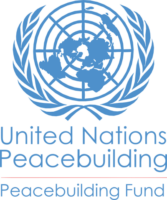A special thank you!
The United Nations Peacebuilding Fund (UNPBF) is the UN’s leading funding instrument for conflict-prevention and peacebuilding. In 2022 it controlled over 40 million USD, operated in 24 countries and supported more than 120 projects worldwide. You can read more about the fund here.

In the Central African Republic (CAR), young people make up nearly 40% of the population. They are often described as unstable, disengaged, or dangerous – but youth themselves tell a different story. In interviews from Sibut and Kaga Bandoro, they speak clearly about what holds them back: lack of access, lack of trust, and a civic space that routinely excludes them from decision-making.
And CAR is not an easy country to be young in – young people face a complex web of barriers. High unemployment, lack of access to education, and limited economic opportunities leave many demotivated or pushed toward risky-coping strategies. Many highlight that their friends and age-mates are turning to alcohol, prostitution or drug-use, due to these circumstances.
Insecurity, administrative hurdles, and social stigma – particularly for young women and informal workers – further restrict youths ability to organize, speak out, or build stable livelihoods. Despite being active in their communities, they are often mistrusted by authorities and seen more as a threat than a resource. But youths also maintain a lot of potential – as Coligara Woligara highlighted:

“The path to success is never easy, but youth
have the energy and courage to weather the
storms, which will lead them to a brighter future.”
– Coligara Woligara (Association for Young Women and Men Working at the Sibut Market)
Another added that youths have been involved in destabilizing the country through engaging in rebel-activity but that this is no longer the case:
“This used to be true before, but it’s no longer the reality. If youth hadn’t resisted the armed groups, the situation wouldn’t have improved like it has. Today, young people are very engaged, resourceful, and doing what they can to take their future into their own hands.”Representative from the organization Jeunes Soudés pour le Développement
And this is what the project tries to tackle – to give young people the opportunity to take their future into their own hands. This intervention responds to the exclusion of young people in CAR by combining civic engagement, leadership training, and psychosocial support — recognizing that meaningful participation begins with both opportunity and wellbeing. It doesn’t treat young people as a problem to be fixed, but as essential actors in peacebuilding and local governance.
What makes this approach unique is its integrated design: it builds political confidence from the ground up while addressing the trauma and social pressures that often prevent young people from stepping forward. By working with informal youth groups, young women, and at-risk populations like moto taxi drivers, the project meets young people where they are — not where institutions assume they should be.
Fortunately, many of the youth also view the future with opportunity, but with one caveat:
“If young people keep helping each other, there is hope”.Representative from Young Women Coffee Vendors
About the project
Full title: Pathways to empowerment: advancing marginalized youth participation to promote a peaceful and democratic culture in the Central African Republic
Timeline: February 2025 to January 2027 (24 months)
Partners: Conciliation Resources, Fondation Vegas Jeunes pour le Développement, M3D and PADDEL
Amount: 2,000,000 USD
The project was launched in February 2025 – read more here.

